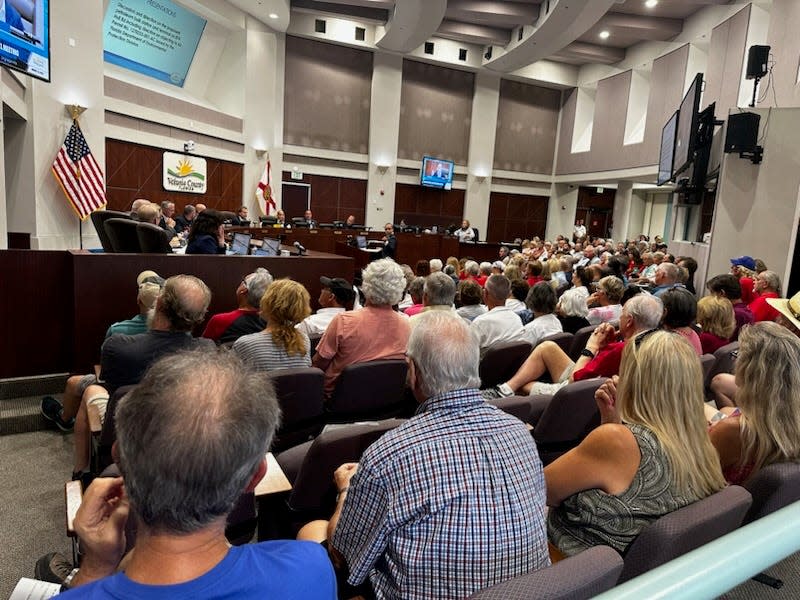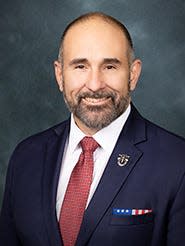Florida Republican senators pass bills through committees helping Belvedere Terminals

Two bills that appear to be tailor-made to help Belvedere Terminals carry out its plan to construct 10 new fuel terminals across Florida − including one near Ormond Beach − have now cleared their first stops in Senate committees.
Among many changes, SB 1624 proposes to establish Florida's natural gas resiliency infrastructure, distinguishing it as critical to maintaining the state's economy and prohibiting local governments from excluding such utilities or companies from commercial, industrial and manufacturing comprehensive plan and zoning categories.
Thus, Volusia County could not prevent a business such as Belvedere Terminals, which transports and stores fuel, including natural gas, from operating through its comp plan and zoning rules.
That bill passed the Senate Regulated Industries Committee by a 4-2 vote and is now headed for an appropriations panel.

Then there is SB 1628, which senators on the Community Affairs Committee debated and passed this week. It builds on a law signed last year that requires local governments to produce "business impact estimates," including the purpose, estimated economic impact on businesses and compliance costs for certain ordinances under consideration.
Mike Benedetto, chief operating officer of Belvedere Terminals, said the company was not aware of the bills until after their filing and was not involved in crafting the language.
Both bills are sponsored by Republican Sen. Jay Collins of Tampa.
The 2023 law − known as SB 170 − was dubbed by its supporters as "the preemption bill to end all preemptions," suggesting that with its existence, the state will no longer need to usurp local control.
But Collins' SB 1628 does just that, expanding the ordinances that fall under the business impact estimates requirement to include local government actions on land-development codes and regulations.
This prompted Sen. Jason Pizzo, D-Sunny Isles Beach, to challenge Collins during the committee hearing Tuesday, asking what prompted the bill, and what issues had arisen with the state's 411 municipalities.
“I will get you that list," Collins responded. "I don’t have any of those details here with me. I am happy to sit down and share that list of what we can talk about, what’s been an issue or not.”
During public comment, 13 individuals, including Volusia County lobbyist John Booker, either spoke against the bill or expressed opposition. No one spoke in favor of it.
Rebecca O’Hara, deputy general counsel for the Florida League of Cities, said the bill would also authorize any person to file a civil action to challenge a municipality's newly enacted land-development regulation, requiring the local government to suspend enforcement of that land development regulation or that comprehensive plan amendment during the pendency of that lawsuit.
That, she said, is incongruous with another state law requiring such comp plan amendments to be enacted within 180 days or they must be withdrawn.
“So this sets up a scenario whereby a local government, if it is sued under the local ordinance process for a comprehensive plan amendment that is alleged to be arbitrary and unreasonable, that comprehensive plan amendment must be suspended until that lawsuit is resolved," O'Hara said. "I don’t many circuit courts that can resolve an entire case within 180 days.”
O'Hara said comp plan amendments and zoning regulations were exempted from SB 170 last year in order to "discourage anti-competitive behavior," such as a shopping mall that might challenge a comp plan allowing an Amazon distribution center, or a restaurant challenging a zoning regulation in order to fend off food trucks.
“You can see there are a number of avenues by which this amendment, this bill, would allow for collateral proceedings to completely gum up the works of a process that you yourselves have required of local governments to proceed under," she said.
Libby Lavette, an environmental advocate from Tallahassee who has also lived in Volusia County, argued the bill "empowers unelected bureaucrats to override local zoning, ripping away the very fabric of our democratic control.“
Collins later offered again to discuss the bill with opponents in his office, and gave a less-than-specific rationale for limiting local governments' attempts to narrow land uses in response to public outcry.
“What we’re talking about here is individual rights, property rights and doing what we think is best for the state," Collins said. "Many of us have divergent paths and approaches to this, right? But that’s what this process does.”
None of the Republicans on the panel asked Collins any questions, while all voted to move the bill forward.
Note: This story was amended after intitial publication to include the statement from Belvedere's COO that the company was not involved in the drafting of the bill, nor aware of its existence until after it was filed.
This article originally appeared on The Daytona Beach News-Journal: Florida Senate committees forward bills that would benefit Belvedere

